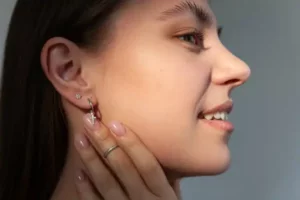Tips for Cleaning Your Ears

Your ears are one of the most sensitive organs of your body. They don’t just help you to capture the sounds around you, they’re also in charge of maintaining your balance. Therefore, it’s important to know how to look after them and keep them clean.
This doesn’t only mean removing excess earwax, but also being careful of your environment. In fact, it’s really important to take care of your hearing as problems with this organ often aren’t easy to cure. Looking after your ears will help prevent infections and illnesses.
In this article, you’ll find out how to clean your ears. It isn’t complicated and requires very little effort.
Cleaning your ears on the outside
Cleaning your ears isn’t just limited to the inside, you also need to keep the outer part clean. That’s because this part ear collects dust and other waste which can enter the ear canal and cause certain health problems.
To clean your ears, the easiest thing to do is:
- Take a cotton ball. Wet it with a little water, but don’t soak it.
- Carefully wash around your ears and behind them. Make sure no dirt remains.
Another thing you need to do for your ears is to avoid or limit listening to loud music for prolonged periods of time. Although it may seem unimportant, this is one of the reasons that young people often end up going to their doctor with hearing problems.
You might also be interested to read: Ear Candling: A Natural Way to Clean Your Ears
Ear wax

Many people think that looking after their ears only means getting rid of earwax. They think that earwax is a sticky, unpleasant, and unhygienic substance. However, nothing could be further from the truth.
As a matter of fact, earwax, also called cerumen, protects the skin inside your ears from infections. So you shouldn’t see it as something unpleasant that you need to get rid of at all costs.
It also protects your eardrum from the surrounding environment. Indeed, earwax stops dust, foreign objects, and any other residue from getting in your ears.
In addition, it protects the inside of your ear from infections and small insects that can enter the auditory canal. Its function is highly important. Therefore, cleaning your ears doesn’t mean cleaning out your earwax.
Cleaning and looking after your ears
When you shower or wash your hair, your ears get rid of earwax naturally. This also happens when there’s too much of it. If you’re going to get your ears wet when you’re showering or bathing, use warm water and try to make sure you don’t get water in your ear canal.
You should also clean your outer ear and the surrounding area and dry it with a soft towel. If you want to use cotton buds or swabs, only use them on the outside of your ear, and don’t introduce them into the auditory canal. They only push the wax further into the ear, worsening your hearing.
You must also avoid submerging your ears in water that isn’t clean. No matter how careful you are, bacteria can easily enter through the external auditory canal and cause various illnesses.
You might also like to read: Remove Earwax Blockage without Damaging Your Ears
Home methods for cleaning your ears
If waiting for your ears to clean themselves naturally seems too slow, there are some home remedies you can try. However, bear in mind that sticking any kind of instrument into your ears is extremely dangerous and should be avoided at all costs.
Try these methods instead but don’t use them regularly. Only carry them out occasionally or when you feel that you have a large build-up of earwax.
1. Saline solution
Saline solution is probably one of the fastest and easiest hygiene treatments for your ears. It’s also economical and easy to prepare.
Ingredients
- 1 tablespoon of salt (10g).
- 1/2 cup of water (125 ml).
Method
- Add a tablespoon of salt to the water.
- Heat the solution a little until it’s warm.
- Soak a cotton ball in the solution. Wring it out and use it to carefully clean your ears.
- Put a couple of drops in your ears to clean them and get rid of any possible pain you may have.
2. Hydrogen peroxide
This is one of the most common ear cleaning methods. That’s because hydrogen peroxide is able to get rid of bacteria in the area without being invasive and with no risk.
- Mix equal parts of water with hydrogen peroxide (three parts water with three parts hydrogen peroxide).
- Take a small cotton ball and soak it in the mixture.
- Rub it around your ears and on the insides extremely carefully.
- Put a couple of drops of the mixture in your ears.
Your ears clean themselves
Despite the tips we’ve mentioned here, you must remember to look after your ears properly and don’t abuse them. In fact, your ears have the ability to remove excess earwax on their own, so invasive cleaning methods are often unnecessary unless recommended by a specialist.
Don’t forget that you should avoid inserting sharp objects into your ear as they can damage the eardrum. Remember that looking after your ears is extremely important as they’re one of the most important organs in your body. Follow our advice and start taking care of them properly.
All cited sources were thoroughly reviewed by our team to ensure their quality, reliability, currency, and validity. The bibliography of this article was considered reliable and of academic or scientific accuracy.
- Byeon H. Associations between adolescents’ earphone usage in noisy environments, hearing loss, and self-reported hearing problems in a nationally representative sample of South Korean middle and high school students. Medicine (Baltimore). 2021 Jan 22;100(3):e24056.
- Burton MJ, Doree C. WITHDRAWN: Ear drops for the removal of ear wax. Cochrane Database Syst Rev. 2018 Jul 24;7(7):CD004326.
- Khan NB, Thaver S, Govender SM. Self-ear cleaning practices and the associated risk of ear injuries and ear-related symptoms in a group of university students. J Public Health Afr. 2017 Dec 31;8(2):555.
- Nagala S, Singh P, Tostevin P. Extent of cotton-bud use in ears. Br J Gen Pract. 2011 Nov;61(592):662-3.
- Oladeji SM, Babatunde OT, Babatunde LB, Sogebi OA. KNOWLEDGE OF CERUMEN AND EFFECT OF EAR SELF-CLEANING AMONG HEALTH WORKERS IN A TERTIARY HOSPITAL. J West Afr Coll Surg. 2015 Apr-Jun;5(2):117-133.
This text is provided for informational purposes only and does not replace consultation with a professional. If in doubt, consult your specialist.








